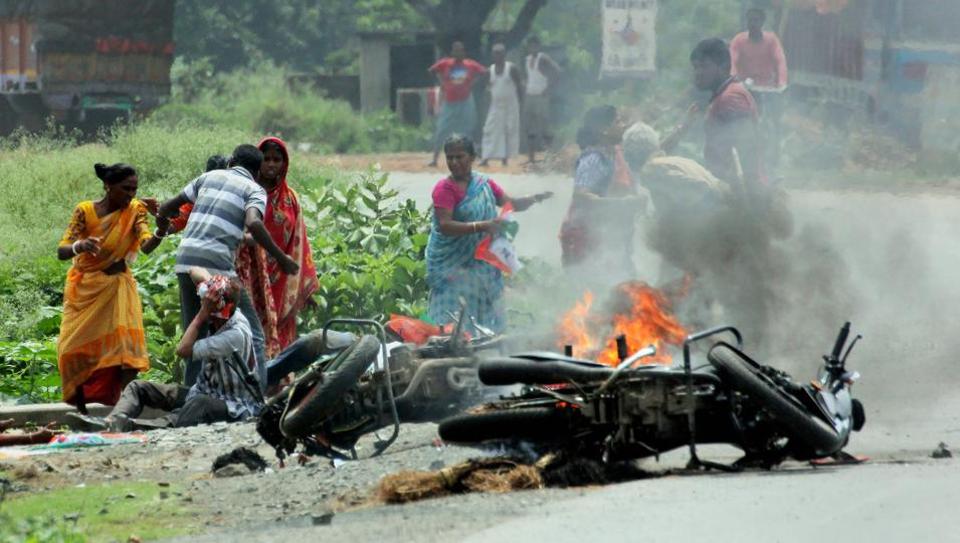
What prompted EC to declare seven-phase polling in West Bengal?

Officers of Kolkata police’s special task force were in for a surprise on March 8 midnight when they intercepted a truck in the heart of the city after getting a tip. Even they were not expecting their nocturnal mission would lead to such a massive seizure of explosives. The truck was smuggling into the state, from mines in neighbouring Odisha, 1,000 kg of potassium nitrates, which is also used in making crude bombs apart from being used as manure.
The STF while probing a bomb blast in a local train recently found that many illegal bomb-making units have mushroomed in southern districts of West Bengal. These units mainly cater to their “customers” affiliated to various political parties, and mostly use potassium nitrates as one of the ingredients in making crude bombs that have become “common weapons” in the state’s political turf-war. Police, suspect the consignment from Odisha was meant for such bomb-making units ahead of the Lok Sabha elections.
Hours after the seizure, the Election Commission on March 11 announced that polling for the West Bengal’s 42 Lok Sabha seats would be held in seven phases from April 11 to May 19, in what can be viewed as an indictment to the state’s deteriorating law-and-order situation.
“The seven-phase election is indicative of the law-and-order situation in the state,” said Communist Party of India (Marxist) politburo member Mohammed Salim. He hoped that unlike in the last year’s panchayat elections, polling would be held in a “free and fair manner and the EC will be impartial, proactive and responsive.”
The TMC, however, reacted to the poll panel’s decision with a tinge of anger, though it was cautious not to express its feelings too overtly.
Soon after the declaration of poll schedule by the chief election commissioner Sunil Arora, senior minister in Mamata Banerjee’s government and Kolkata Mayor Firhad Hakim expressed discontentment over dragging elections for too long in the state, saying it would inconvenience people, particularly the minorities during Ramzan and summer months.
The BJP as expected, welcomed the commission’s decision saying it would reinforce democracy in the state.
Spurt in political violence
Violence is entrenched in the politics of West Bengal with its root tracing back to pre-independence anti-colonial armed struggles. From the Communist-backed Tebhaga peasants’ movements against Congress-backed landlords, communal bloodshed of the 1946 Great Calcutta Killing, the armed Naxal insurrection of the 1970s, the Left Front government-sponsored violence against Marichjhapi refugees, to the Nandigram and Singur movements, the political history of the state is mired in violence. The violence is often seen as a force of transformation in West Bengal, said veteran journalist Subir Bhaumik.
But what was witnessed during the last year’s panchayat elections was unprecedented in any rural polls in the state. More than 20 persons were killed and many more were injured. Of the deaths that took place, at least 13 of them reportedly belonged to the TMC.
Since then, the state has witnessed a slew of political violence, mainly between supporters of the ruling Trinamool Congress (TMC) and the up-surging Bharatiya Janata Party (BJP), and some political killings, including that of the ruling party lawmaker Satyajit Biswas last month. Police booked senior BJP leader Mukul Roy among others, for the murder. The BJP, however, refuted the charges saying the killing was a result of the TMC’s infighting. The BJP had moved the Supreme Court last month seeking a CBI probe into the recent murder of three of its workers in West Bengal.
Communal violence too is in rise in the past three to four years in the state. According to a Home Ministry statistics West Bengal witnessed 117 cases of communal violence between 2015 and 2017.
The BJP accused Mamata Banerjee of disturbing the communal harmony with her Muslim appeasement policy. The TMC, on the other hand, accused the BJP of stoking communal tension to further its Hindutva plank in a bid to make political inroads in the state.
Amidst the political slugfest, with BJP desperately trying to expand its base in West Bengal and the TMC retain its stronghold, the seven-phase polling was perhaps the only viable option before the EC to ensure free and fair elections in the state.


